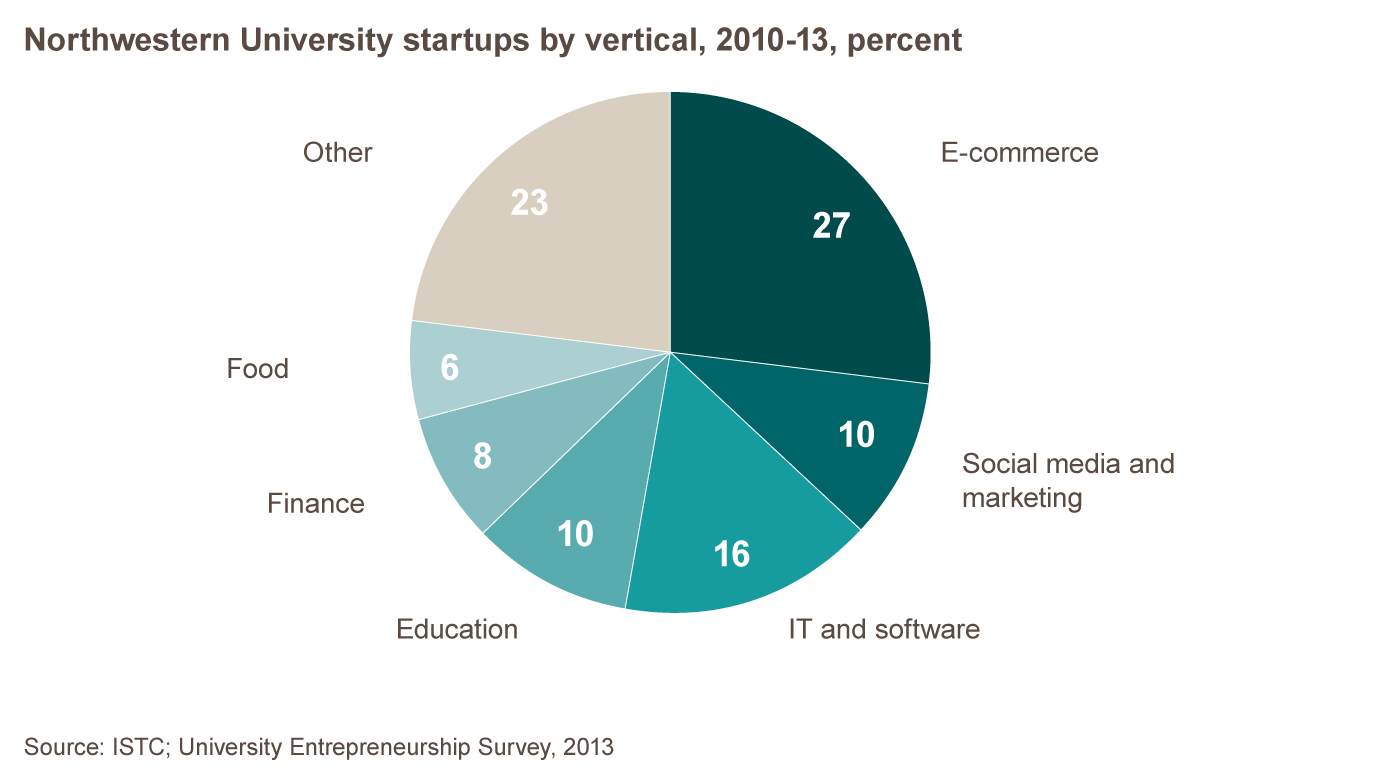By Linda Darragh, Clinical Professor of Entrepreneurial Practice, Executive Director of the Kellogg Innovation and Entrepreneurship Initiative, and ISTC Board Member
Success for startups is more about the team than the idea. For years, we have heard that investors are more interested in an “A team” with a “B idea,” than the “B team” with an “A idea.” So if the team is a key factor in success, the question is how do we build great teams?
As demonstrated by the ISTC’s recently published University Startup Report, many of Illinois’ universities are focusing their efforts on entrepreneurship across campus, with an emphasis on interdisciplinary learning opportunities. Northwestern University is an example of an academic institution that has schools offering instruction in engineering, law, business, medicine, journalism and media, coupled with research centers generating cutting-edge technologies. For seven years, the NUvention courses have been creating interdisciplinary teams to develop startup companies in the verticals of medical devices, energy, web and social impact. Several new interdisciplinary courses are being tested this spring.
However, success is not assured by simply placing students from different disciplines on a team and helping them launch. Mark Werwath, associate clinical professor and associate director of the Farley Center for Entrepreneurship and Innovation at the McCormick School of Engineering, teaches the NUvention Energy course made up of interdisciplinary teams. For Werwath, the team makeup is paramount. “There are some real challenges in terms of making sure that each team has the proper mix of skills, and at the same time making sure the students on any given team have the passion and drive for the value proposition.”
Samir Mayekar, CEO of SiNode Systems, the NUvention course startup team that won the prestigious Rice Business Plan Competition last year, believes that there is another critical factor to success. “Each side needs to step into the others’ shoes to appreciate the magnitude of opportunities and challenges. That empathy strengthens the team.”
To achieve this empathy, Bill Sutter, senior lecturer of finance at the Kellogg School of Management, begins the NUvention Medical course with students teaching one another about their specialty and how it relates to their project. Leslie Oster, clinical associate professor at the Northwestern University School of Law, adds that the best teams “lean in” to understand the intersection of their specialties. They should not compartmentalize their knowledge. “A PTO patent search is going to be more productive with both a law student and a medical student working together,” explains Oster. The best teams find a synergy that allows them to combine their knowledge to take their startups to the next level.
The experience of working with interdisciplinary teams is yielding success for the startups spawned by the NUvention courses. For the last two years, interdisciplinary teams from Northwestern have won competitions such as the Rice Business Plan competition, the U.S. Department of Energy’s Clean Energy Business Plan Competition, the Chicago Innovation Awards and TechWeek Launch. More importantly, these startups continue to build their businesses after graduation.
Did You Know?


In 2013 the ISTC conducted the first ever data collection on startup creation at Illinois’ universities. To date, the volume and diversity of entrepreneurial activity facilitated by Illinois university entrepreneurship programs and resources, such as startup competitions, incubation services, and technology transfer, had not been comprehensively documented. Startups are considered affiliated to a university if the founders were students or faculty at the time of the company’s creation and benefited from entrepreneurship services and resources at the university during the time of their studies or employment at the university. The ISTC found that at least 354 university startups were created between 2010 and 2013 with 283 of these still active. As many as a third of these came from Northwestern University. Over half of Northwestern active startups are web and IT enabled, with almost a third providing e-commerce services.
Watch and Listen:
Polsky Center faculty and students explain how the entrepreneurship center aids company creation
Learn:
- Northwestern Farley Center for Entrepreneurship
- Northwestern Levy Entrepreneurial Institute
- University of Chicago Polsky Center for Entrepreneurship
- Illinois Institute of Technology’s Knapp Center for Entrepreneurship
- EnterpriseWorks at the University of Illinois, Urbana–Champaign
- University of Illinois, Chicago, Innovation Center
- Southern Illinois University and the Metro-East Startup Challenge
- Social Venture Business Plan Competition at Northern Illinois University
- Bradley University Turner Center for Entrepreneurship
More News:
- The complex dance of connecting corporations and startups
- Governor Quinn Announces MATTER, a New Healthcare Technology Startup Hub
- Chicago biotech incubator gets state funding
- Howard Tullman streams ideas at Startup Forecast
- Attend the 2014 Midwest Energy Forum on February 21st
Illinois Innovation Network Featured Resource:
Each month, the Illinois Science and Technology Coalition features a service or resource available to innovators and entrepreneurs in the state of Illinois on the Illinois Innovation Network. To learn more and add your resource to the Network, click here.
 Metro East Start-Up Challenge
Metro East Start-Up Challenge
The SIUE Metro East Start-Up Challenge is a business plan competition to recognize and reward excellence in entrepreneurship. Sponsored by University Park at SIUE, the challenge offers $15,000 cash prize business plan competition for entrepreneurs and new business start-ups in the Illinois portion of the St. Louis metropolitan area.

